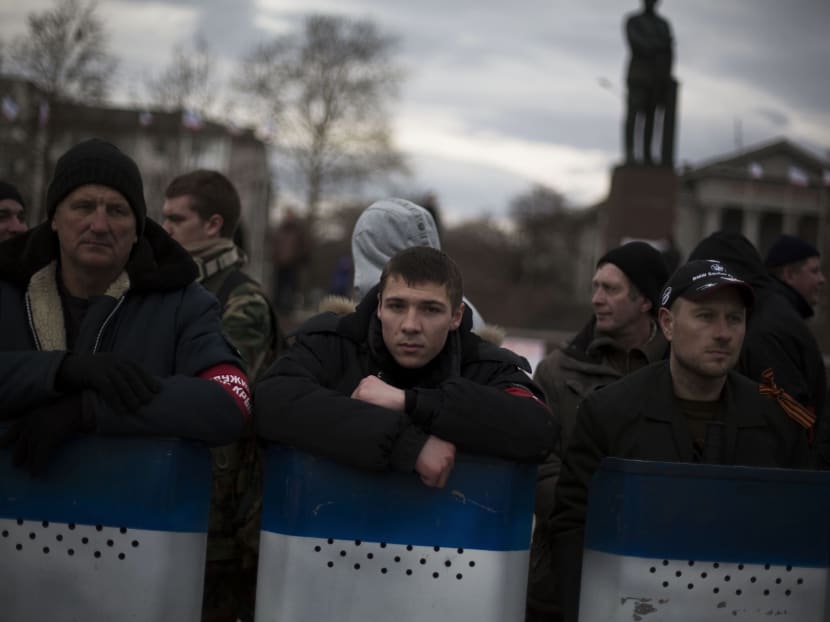Crimean stand-off shows international law ‘must be preserved to protect smaller nations’
SINGAPORE — International law must be preserved for the security of smaller countries, said Ukraine’s Ambassador to Singapore, Mr Pavlo Sultansky, yesterday in an interview, emphasising that the options are limited for smaller countries in the face of conflicts with large neighbours.

Volunteers of a self defence group stand guard in Lenin Square after marching in the center of Simferopol, Crimea, Ukraine, on March 8, 2014. Photo: AP
SINGAPORE — International law must be preserved for the security of smaller countries, said Ukraine’s Ambassador to Singapore, Mr Pavlo Sultansky, yesterday in an interview, emphasising that the options are limited for smaller countries in the face of conflicts with large neighbours.
Tensions have been riding high between Kiev and Moscow amid a stand-off over Ukraine’s southern region of Crimea, which is due to hold a referendum tomorrow on whether it should become part of Russia. Moscow has been steadily amassing troops in the area.
The US and European Union (EU) have threatened sanctions against Russia if it does not back down from annexing the Black Sea province and agree to global monitors in Crimea.
Reflecting on the situation between his country and Russia, Mr Sultansky acknowledged the limitations of Ukraine’s military capabilities in comparison to those of Russia in the face of the escalating conflict.
“In terms of military defence potential and especially in terms of manpower, numbers and arms — the two armies cannot be compared with each other,” he said.
He added that the crisis underscored the importance for smaller countries to ensure that basic principles of international law are protected, given that they face the might of larger, stronger neighbours.
“The total violation of international law demonstrated by the Russian Federation brings an absolutely new or a probably well-forgotten problem of the responsibility of powers to (stay true to) their commitments. If international law is so easily infringed, it means something is wrong not only with … this or that country, but with international law also,” said the diplomat, who was appointed envoy to Singapore in July 2010.
The stand-off in Crimea was sparked after mass protests in January toppled Ukrainian President Viktor Yanukovich, who is pro-Russia.
Crimea, a Russian-majority region of Ukraine, whose Parliament has voted to be part of Russia, is due to hold a referendum on Sunday to decide whether it will become part of Russia. Moscow yesterday warned that Ukraine’s interim government had lost control of the nation, fuelling concern that the Kremlin might seek to extend a military intervention to Crimea.
Ahead of tomorrow’s vote in Crimea, Mr Sultansky reiterated that Ukraine does not recognise the autonomous region’s referendum, calling it illegal. “The referendum is totally outside the legal environment of the country ... There should be no civilised and internationally recognised instruments other than (those that are) diplomatic, which are able to put an end to any conflict,” he said.
He also praised the efforts of the US and the EU to help the country deal with the crisis. “We are really thankful to the US and EU, which already reacted very decisively and in a very practical manner,” he said, adding that he had no doubts that Europe is ready to go as far as it is necessary to “tie up the aggressor”.
The US and its allies are also seeking to bolster the country with key financial support from the International Monetary Fund, as Kiev needs as much as US$15 billion (S$19 billion) in loans to repay billions in foreign debt and help it avoid default. WITH AGENCIES






